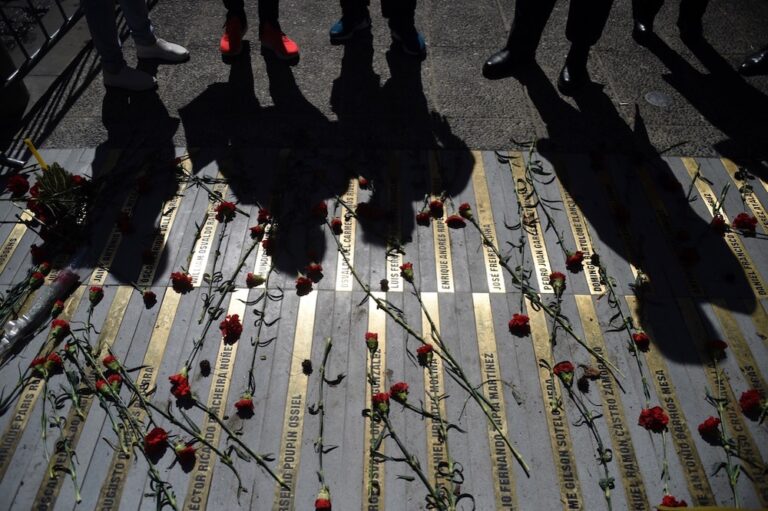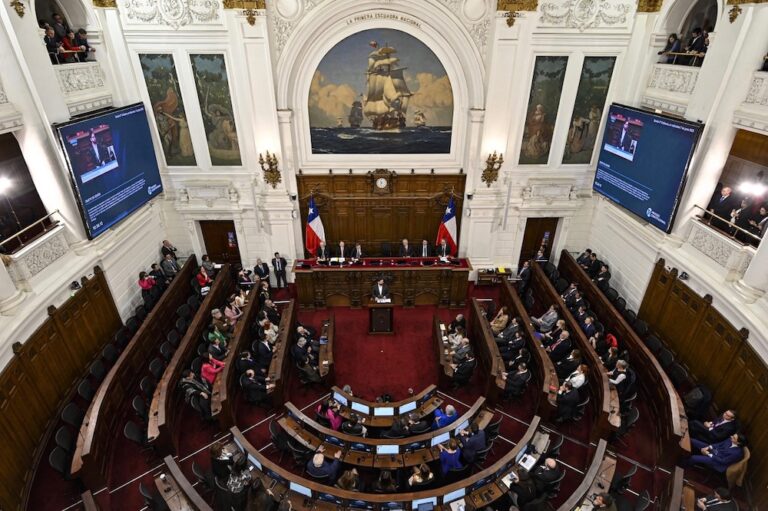(IPYS/IFEX) – On 13 December 2001, Judge Marcos Felzenstein of the Valparaíso Sixth Criminal Court absolved Paula Afani, journalist from “La Tercera” newspaper, of the case launched against her in 1998 by the State Defense Council (Consejo de Defensa del Estado, CDE). However, the CDE appealed the decision on 18 January 2002, asking that Afani […]
(IPYS/IFEX) – On 13 December 2001, Judge Marcos Felzenstein of the Valparaíso Sixth Criminal Court absolved Paula Afani, journalist from “La Tercera” newspaper, of the case launched against her in 1998 by the State Defense Council (Consejo de Defensa del Estado, CDE). However, the CDE appealed the decision on 18 January 2002, asking that Afani be sentenced to five years and one day in prison for reporting on a legal case involving drug trafficking and money laundering that the CDE was investigating.
Judge Felzenstein ruled on the matter on 13 December and the parties involved were notified of his decision during the week of 14 January.
The case dates from January 1999, when the CDE filed a complaint against Afani for “violating the summary procedure”, in accordance with Law 19366, which sets out the penalty for Illicit Drug Trafficking, or the Drug Law as it is more commonly known. Afani was also accused of violating the Law on Publicity Abuses (Ley de Abusos de Publicidad, LAP), which was repealed under the current Press Law.
The action was launched after “La Tercera” and “La Hora” published a series of articles by Afani in June 1998 on the investigation into a drug trafficking and money laundering case known as “Operación Océano” (“Operation Ocean”). The reports were published while the investigation was at the summary stage, a step in criminal procedure during which legal proceedings are to be kept secret.
The CDE filed the complaint against Afani to force her to reveal her sources. The journalist refused, arguing that it was her ethical duty to guard professional secrets and a right granted all journalists in the new Press Law, approved in 2001 (see IFEX alerts of 30 and 28 May, 25, 23, 19, 17 and 6 April, 20 and 15 March, 22 and 15 February 2001 and others).
After Afani’s refusal to reveal her sources, an order for her arrest was issued on 15 January 1999 and the Chilean civil police force known as Investigaciones raided her home and place of employment. She was released a few days later but the case is still outstanding.
Felzenstein absolved Afani of the charges she was facing for violating the LAP law. Article 19 of the law set out the penalty for those individuals who distributed information on official procedures which were deemed confidential under the law. This law was repealed when the Press Law was approved. Therefore, the judge applied the “pro reo” principle, which absolves the defendant of charges when the crimes she or he is accused of no longer exist under the law.
Nevertheless, the CDE appealed to the Valparaíso Appeals Court to repeal the judge’s decision and try Afani under the Drug Law. In accordance with Article 34 of the law, a judge can decide that information on a summary proceeding should not be revealed. However, the article does not specify that the press cannot report on a legal case. Afani’s defence and a number of politicians who have commented on her case argue that the article refers to officials who have privileged information on a summary proceeding and not to journalists. Journalists’ task, it is argued, is to distribute information and not ensure that the details of a legal investigation are kept secret.
Since the judge did not rule on the complaint filed against Afani for violating the summary procedure as per the Drug Law, the CDE also filed an appeal for annulment under this criteria. The CDE called for Afani to be imprisoned for five years and one day, a sentence which is not subject to appeals for release under the Drug Law.
The journalist believes that Clara Szczaranski, who was CDE president when the legal action was launched, has a personal vendetta against her. “Everything I reported on was true. No one denied this, not the Carabineros, not the Court, not even the CDE,” Afani told IPYS. A few weeks ago, Szczaranski filed a complaint for insult against “El Mercurio” newspaper (see IFEX alert of 16 January 2002). Furthermore, Afani has written a number of articles on Szczaranski’s actions as a lawyer. These articles came under the Supreme Court’s scrutiny in late 2001.
Afani has been facing this action for the last three years. She is under a restriction order, which means that if she wishes to leave the country she needs to ask the judge for authorisation and pay a bond. She is also required to report to the court once a month.
When asked about how she thought the appeal would be received, Afani told IPYS that it was all very unclear. Since the case does not involve an individual in detention, there is no deadline by which the Valparaíso Appeals Court must respond, which means that it could take as long as six months to rule on the appeal.
“Operación Océano” is an investigation into drug trafficking and money laundering led by the CDE, in accordance with the powers granted to the institution by the Drug Law.
Afani’s June 1998 reports contained previously unpublished details on the case. According to the journalist, when the case was first launched against her, “there was no order preventing information on the case from being distributed. It was assumed that the investigation was so conclusive that this information would not obstruct justice. It was only later that I was accused, when the actual results ended up being different from what was expected.” Indeed, the court did not prohibit information from being distributed until the end of June 1998, after Afani’s articles had been published.
When the action against the “La Tercera” journalist was launched, CDE President Sczsaranski pointed out that Afani could protect her sources, but it was unacceptable to have details disclosed about the process involved in drug trafficking cases.
Nevertheless, Afani told IPYS that this secrecy will not be sustainable under the more progressive reform of the criminal system, which is already being practiced in four of the country’s regions, and which establishes oral and public trials.
Recommended Action
Send letters of support to:
Paula Afani Saud
Journalist for “La Tercera” newspaper
E-mail: pafani@copesa.cl
Send appeals to the CDE president:
– protesting the action faced by Afani
Appeals To
Clara Szczaranski Cerda
State Defense Council President
Santiago, Chile
Fax: +56 2 688 9224
Please copy appeals to the source if possible.
For further information, contact Guillermo Castro at IPY


